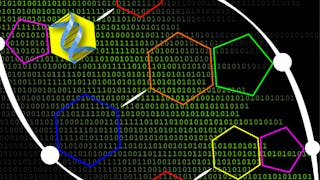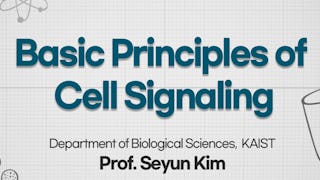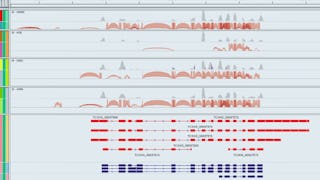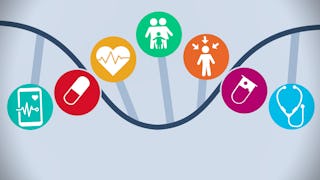While the human genome sequence has transformed our understanding of human biology, it isn’t just the sequence of your DNA that matters, but also how you use it! How are some genes activated and others are silenced? How is this controlled? The answer is epigenetics.

Early bird sale! Unlock 10,000+ courses from Google, IBM, and more for 50% off. Save today.


Epigenetic Control of Gene Expression

Instructor: Dr. Marnie Blewitt
51,753 already enrolled
Included with 
(824 reviews)
Skills you'll gain
Details to know

Add to your LinkedIn profile
6 assignments
See how employees at top companies are mastering in-demand skills

There are 7 modules in this course
An introduction to and definition of epigenetic control of gene expression, and its importance in normal development. We will learn what chromatin is, and how its composition and packaging can alter gene expression. We’ll also discuss the best-characterised epigenetic modification, DNA methylation, and how it is not only implicated in regulating gene expression, but also in maintaining genome stability.
What's included
7 videos5 readings1 assignment
We’ll discuss the molecular mechanisms for regulating gene expression in some detail, from how the DNA is packaged at a local level, right up to how the chromatin is positioned within the nucleus. We’ll learn about the chromatin modifications implicated in gene silencing and activation, the role of non-coding RNA, and higher order chromatin structures. This week will provide you with a good understanding of the basic mechanisms that will help you understand the processes we discuss throughout the rest of the course.
What's included
9 videos1 reading1 assignment
X chromosome inactivation is a really well-characterised epigenetic process that is now used as a model system to study epigenetic processes that are relevant more broadly. This is because it uses many epigenetic mechanisms, at many levels, to achieve really stable silencing of a whole chromosome. We’ll learn about this process and how it occurs in a mouse in great detail, which will greatly add to the mechanistic understanding gained in week two. We will then briefly discuss alternate mechanisms for dosage compensation that occur in other organisms.
What's included
12 videos1 reading1 assignment
We’ll learn about the two important periods during development for the erasure and resetting of the epigenome. There are two well-characterised features that are treated differently during epigenetic reprogramming; imprinted genes and repeats. We’ll learn about mechanisms for genomic imprinting, and study three examples in more depth.
What's included
6 videos1 reading1 assignment
We start to look at some of the big areas of interest in human epigenetics, including environmental influence on the epigenome, reprogramming of somatic cells back to stem cells, cloning, and potential transgenerational epigenetic inheritance. We’ll discuss what is known to happen to the epigenome during these process, and look at some seminal case studies.
What's included
6 videos1 reading1 assignment
A look at the mechanisms underlying some of the observations we discussed in week 5, through the study of model organisms. We’ll learn about metastable epialleles, which have allowed the study of transgenerational epigenetics in mice, and provided some evidence for transgenerational epigenetics in mammals.
What's included
8 videos1 reading1 assignment
This week we’ll bring together much of what we’ve learned in previous weeks of the course, to understand how the epigenome is affected, and can also affect, cancer development and progression. We’ll then go on to discuss the potential therapeutic benefits that can come from using epigenetic biomarkers, and targeting epigenetic modifiers in cancer.
What's included
11 videos3 readings1 peer review
Earn a career certificate
Add this credential to your LinkedIn profile, resume, or CV. Share it on social media and in your performance review.
Instructor

Offered by
Explore more from Basic Science
 Status: Free Trial
Status: Free Trial
Johns Hopkins University


Korea Advanced Institute of Science and Technology(KAIST)


Johns Hopkins University


University of Geneva
Why people choose Coursera for their career




Learner reviews
824 reviews
- 5 stars
86.90%
- 4 stars
10.90%
- 3 stars
1.45%
- 2 stars
0.12%
- 1 star
0.60%
Showing 3 of 824
Reviewed on Oct 1, 2018
This was an excellent course. All the material was well presented and the explanation of the sometimes complex subject matter was clear and understandable. Thank you for an great learning experience.
Reviewed on Jun 18, 2016
The course is very interesting for those who like Genetics. The lectures are delivered in an understandable manner, and the motion pictures make everything clear right away.
Reviewed on Jul 20, 2019
A great learning platform. This was my first ever course on coursera and I've thoroughly enjoyed it. A big thank you to Dr. Marnie Blewitt for helping us learn in a fun way!

Open new doors with Coursera Plus
Unlimited access to 10,000+ world-class courses, hands-on projects, and job-ready certificate programs - all included in your subscription
Advance your career with an online degree
Earn a degree from world-class universities - 100% online
Join over 3,400 global companies that choose Coursera for Business
Upskill your employees to excel in the digital economy
Frequently asked questions
Access to lectures and assignments depends on your type of enrollment. If you take a course in audit mode, you will be able to see most course materials for free. To access graded assignments and to earn a Certificate, you will need to purchase the Certificate experience, during or after your audit. If you don't see the audit option:
The course may not offer an audit option. You can try a Free Trial instead, or apply for Financial Aid.
The course may offer 'Full Course, No Certificate' instead. This option lets you see all course materials, submit required assessments, and get a final grade. This also means that you will not be able to purchase a Certificate experience.
When you purchase a Certificate you get access to all course materials, including graded assignments. Upon completing the course, your electronic Certificate will be added to your Accomplishments page - from there, you can print your Certificate or add it to your LinkedIn profile. If you only want to read and view the course content, you can audit the course for free.
You will be eligible for a full refund until two weeks after your payment date, or (for courses that have just launched) until two weeks after the first session of the course begins, whichever is later. You cannot receive a refund once you’ve earned a Course Certificate, even if you complete the course within the two-week refund period. See our full refund policy.
More questions
Financial aid available,

